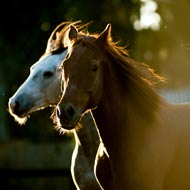Up to 50,000 horses 'disappeared' during scandal

Horses started to disappear in 2008 during the financial meltdown and it is "probable" they ended up in the food chain.
As many as 50,000 horses across Europe are said to have 'disappeared' and most likely ended up in the food chain during the 2013 horse meat scandal.
The claims were made by food fraud expert Professor Chris Elliott at a recent conference at the Doncaster Racecourse.
Prof Elliott led the investigation into the 2013 horse meat scandal, where beef products were found to contain horse meat. His report was published in 2014.
Now, he is warning that the UK could face a similar scandal unless the authorities and police take action.
Speaking at the 2015 Fighting Food Fraud conference, Prof Elliot said horses started to disappear in 2008 during the financial meltdown and it is "probable" they ended up in the food chain.
Horse & Hound quotes him as saying: "2013 was a wake up call for the UK. With organised gangs becoming attracted into food fraud, we must act now to prevent public health threats.
"The idea that 50,000 horses could just disappear may seem incredible to some, but the scale at which some of these gangs can operate is huge."
Whilst he said that establishing a national food crime unit is a "good first step", a collaborative approach is needed to improve the tracking and auditing of the food supply chain.



 The Veterinary Medicines Directorate (VMD) is inviting applications from veterinary students to attend a one-week extramural studies (EMS) placement in July 2026.
The Veterinary Medicines Directorate (VMD) is inviting applications from veterinary students to attend a one-week extramural studies (EMS) placement in July 2026.